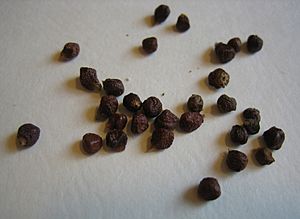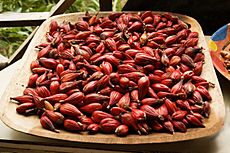Grains of paradise facts for kids
Quick facts for kids Aframomum meleguetagrains of paradise |
|
|---|---|
 |
|
| Scientific classification |
|
| Kingdom: | Plantae |
| Clade: | Tracheophytes |
| Clade: | Angiosperms |
| Clade: | Monocots |
| Clade: | Commelinids |
| Order: | Zingiberales |
| Family: | Zingiberaceae |
| Genus: | Aframomum |
| Species: |
A. melegueta
|
| Binomial name | |
| Aframomum melegueta K. Schum.
|
|
| Script error: The function "autoWithCaption" does not exist. | |
| Synonyms | |
|
Amomum melegueta |
|
Script error: No such module "Check for conflicting parameters".
Aframomum melegueta is a plant from the ginger family, called Zingiberaceae. It is closely related to cardamom. People use its seeds as a spice. They taste strong, like black pepper, but also have a hint of citrus.
This spice is commonly known as grains of paradise. Other names include melegueta pepper, Guinea grains, ossame, or fom wisa. Sometimes, it is confused with alligator pepper. The name Guinea pepper is also used, but usually for a different plant called Xylopia aethiopica (grains of Selim).
This plant grows naturally in West Africa. This area is sometimes called the Pepper Coast or Grain Coast because of this spice. It is also an important plant grown for money in the Basketo district of southern Ethiopia.
Contents
What are Grains of Paradise?
Aframomum melegueta is a type of herbaceous perennial plant. This means it is a plant that lives for more than two years and does not have a woody stem. It grows in swampy places along the coast of West Africa.
Flowers and Seeds
The plant has purple, trumpet-shaped flowers. These flowers grow into pods that are about 5 to 7 centimeters (2 to 3 inches) long. Inside these pods are many small, reddish-brown seeds.
The strong, peppery taste of the seeds comes from special chemicals called aromatic ketones. One of these is called paradol. Other plants, like cardamom, get their flavor from essential oils. But in grains of paradise, these oils are only found in very small amounts.
Plant Appearance
The stem of the plant can be short. It often has marks from old leaves that have fallen off. The leaves are thin and look like bamboo leaves. They have a clear system of veins.
The flowers smell nice. They have an orange lip and a pinkish-orange upper part. The fruits hold many small, shiny, golden red-brown seeds.
How Grains of Paradise are Used
Melegueta pepper is often used in cooking in West and North Africa. From there, it was traditionally carried by camel caravans across the Sahara desert. It then reached Sicily and other parts of Italy.
History in Europe
An ancient Roman writer named Pliny mentioned it as "African pepper." But then, people in Europe forgot about it for a long time. Later, in the 14th and 15th centuries, it became popular again. It was renamed "grains of paradise" and was used instead of black pepper. A French cookbook from the Middle Ages even suggested using it to make wine taste better if it smelled old.
In 1469, King Afonso V of Portugal gave a merchant named Fernão Gomes the only right to trade in the Gulf of Guinea. This included trading Aframomum melegueta, which was then called malagueta pepper. This shows how valuable the spice was in Europe.
After Christopher Columbus arrived in the New World in 1492, he brought back the first samples of chili peppers (Capsicum frutescens). People then started using the name "malagueta" for these new chili peppers because they were also spicy. The malagueta chili remained popular in places like Brazil, the Caribbean, Portugal, and Mozambique.
Decline and Comeback
The importance of A. melegueta is shown by the fact that a part of Liberia was named the Grain Coast or Pepper Coast. This was because grains of paradise were easy to find there.
Later, the spice became less popular. It was mostly used to flavor sausages and some drinks. In the 18th century, its import to Great Britain almost stopped. This was because a law by King George III made it illegal to use it in certain drinks. By 1880, it was mainly used in animal medicine. It was also sometimes used illegally to make drinks like beer and gin seem stronger.
Modern Uses
Today, grains of paradise are sometimes used in fancy cooking. Chefs use them as a replacement for pepper or to add a special taste to craft beers, gins, and a Norwegian drink called akvavit.
This spice is becoming a bit more popular in North America. Some famous chefs, like Alton Brown, use it in their recipes. For example, he uses it in okra stew and apple pie. Some people on special diets, like a raw food diet, also use grains of paradise. They believe it is easier to digest than black pepper.
Benefits for Animals
Scientists have noticed that lowland gorillas in the wild eat these seeds. This seems to help their heart health. They also eat the leaves and use them for bedding. Gorillas in zoos sometimes have heart problems. This might be because they do not get to eat grains of paradise.
Traditional Uses
In West African traditional medicine, grains of paradise are valued for their warming and digestive properties. Among the Efik people in Nigeria, they have been used in special ceremonies to find out who is guilty. A. melegueta has also been brought to the Caribbean and Latin America. There, it is used in religious ceremonies.
See also
 In Spanish: Granos del Paraíso para niños
In Spanish: Granos del Paraíso para niños
 | Misty Copeland |
 | Raven Wilkinson |
 | Debra Austin |
 | Aesha Ash |


